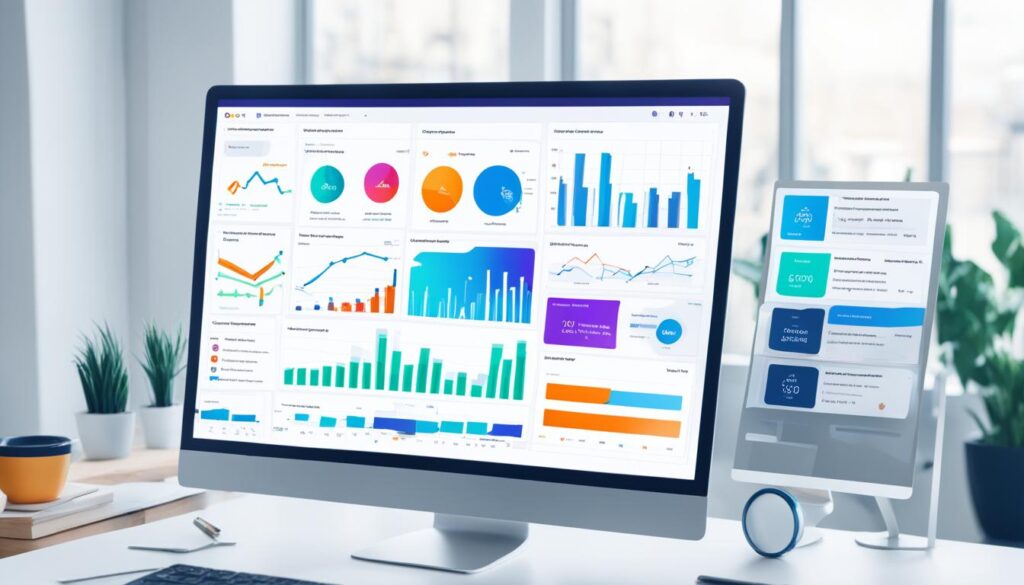“The best marketing doesn’t feel like marketing.” This thought, shared by Tom Fishburne, highlights the power of customized marketing. In the modern world, Artificial Intelligence (AI) changes how small and medium enterprises (SMEs) connect with their audience. It allows them to sift through large data and truly understand customer feelings. AI technology has grown advanced, aiding in predictive analytics and large-scale personalization for SME marketing.
SMEs gain a lot by using AI in their marketing plans. It lets them compete well against bigger companies. AI tools improve how SMEs perform on social media. They give SMEs ways to manage their online presence better. By analyzing big data, SMEs can shape their methods to better reach their target market. This means they can offer more personal and appealing experiences to customers. They use predictive analytics to predict trends from past data. This helps SMEs make smart choices in their marketing plans.
Key Takeaways
- AI-assisted platforms can significantly enhance social media marketing for SMEs.
- Predictive analytics empowers SMEs to forecast and act on future trends.
- Vast data analysis enables tailored marketing approaches for specific audiences.
- AI-driven chatbots provide instant, personalized customer service at scale.
- Personalized marketing campaigns result in higher engagement and increased sales.
- AI tools help SMEs optimize marketing spending and improve ROI.
Introduction to AI in SME Marketing
AI is changing how SMEs market themselves. It offers tools to create content, analyze data, and decide wisely. These tools include chatbots, predictive analytics, and personalized content. They let SMEs connect with customers in new and effective ways.
Stats show AI’s impact: customer satisfaction jumps by 73% and engagement by 89%. Chatbots boost engagement by 47%. Also, SMEs’ ROI goes up by 61% thanks to AI’s targeted marketing. This proves AI’s big role in improving marketing.
AI-driven personalized content spikes engagement by 56%. AI cuts wasted ad spend by 67%, making marketing more efficient. It also ups sales success by 18% and lifts customer satisfaction and conversion by over 40%. These benefits show how critical AI is for marketing success.
AI shines in analyzing marketing sentiments. It gives SMEs insights from customer feedback. This helps them make smart decisions and enhance marketing strategies. AI keeps content relevant, boosting customer happiness and campaign effectiveness.
But AI’s use goes beyond marketing. It helps in delivering products, managing operations, and enhancing customer service. AI-curated newsletters boost open and click rates. Also, AI content improves engagement online. Predictive analytics refine ad strategies, aiming for the best campaign results.
Tools like Xero, Frase, and Grammarly are crucial for small businesses. They automate services, making them seem human. These tools handle bookkeeping, predict cash flow, and delve into data. AI analytics further aid in understating web data. This leads to sharper marketing strategies.
Finally, companies should follow a structured process to harness AI fully. AI’s vast availability and varied applications are key for SMEs. They help fine-tune marketing approaches and improve business operations overall.
Understanding Sentiment Analysis
Sentiment analysis is a powerful AI tool. It reads customer emotions from online actions. It offers strategic insights with advanced algorithms. This tech is more advanced than old methods. It helps small and medium businesses (SMEs) understand how customers act and predict future trends. This info guides their marketing plans.
Only 4% of unhappy customers actually tell companies they’re upset. This shows how important sentiment analysis is to find out what most customers really think. Gillette’s issue in 2019 proves this point. They saw their popularity drop due to negative feedback. But, they used sentiment analysis for a new campaign that got great reactions from people.

Big stores like Walmart, Target, and Costco use sentiment analysis too. They apply it to understand customer opinions for marketing. This helps them change their marketing to match what people feel. Having enough data is key for sentiment analysis to work well. Companies must solve data shortages to get the full benefits.
In 2020, Bain & Company found that 54% of companies used sentiment analysis. They predict this will rise to 80% by 2023. Artificial neural networks are 85% accurate in sentiment analysis, showing these tools are reliable.
There’s a big difference in how businesses and customers see brand opinions. Over half of businesses think their customers view them positively. Only 15% of customers agree. This highlights why companies need sentiment analysis. It helps make sure businesses and customers see eye to eye. It also improves customer loyalty by making services better.
Real-life stories show how sentiment analysis helps. Nike used it in 2018 when they supported NFL player Colin Kaepernick. Many industries, from healthcare to customer service, use sentiment analysis. It boosts their market intelligence and strategic insights. This shows how widely beneficial sentiment analysis is across different fields.
Sentiment Analysis for SME Marketing
In today’s fast-paced digital world, sentiment analysis is key for SMEs. It helps them understand and use customer feedback. This knowledge can boost their marketing efforts greatly.

Using sentiment analysis lets SMEs grasp what consumers feel. They can improve how they connect, what they offer, and keep customers coming back. This way, they make marketing that truly speaks to people.
Sentiment analysis comes in three styles: Rule-Based, Lexicon-Based, and Machine Learning-Based. Rule-Based uses fixed rules. Lexicon-Based works with emotion scoring systems. Machine Learning-Based learns from examples to judge feelings.
About 73% of businesses use sentiment analysis to watch their brand. Big names like Walmart do it to get what customers want and better their service. They need lots of good data for useful insights.
Understanding sentiment in business has its hurdles. Language is tricky with its sarcasm and cultural quirks. Yet, doing it right means really hearing your customers. This helps in making better products and more.
Sentiment analysis gives insights that old-school marketing can’t. Take Gillette’s campaign as an example. It had mixed reviews at first. But with sentiment analysis, they turned the tide to positive attention.
SMEs gain a lot from sentiment analysis. It lets them connect on a deeper level, not just sell. This builds loyal, happy customers.
Benefits of AI-Driven Customer Sentiment Analysis
In 2024’s competitive digital marketing scene, knowing how customers feel is key to success. Both businesses and nonprofits need cutting-edge tools to stay on top. This highlights a major advantage of sentiment analysis benefits: using AI to gather important insights from what customers say.

Sentiment analysis uses natural Language Processing (NLP) and AI to understand feelings in text. This lets organizations shape their messages to match how customers feel. It improves understanding and engagement with customers.
Personalized Customer Interactions
A crucial benefit of AI-driven sentiment analysis is AI-driven personalization in talking to customers. AI can guess what each person likes, so companies can make content that fits better. For example, AI chatbots handle many questions at once. They learn and give better answers over time. This boosts efficiency and frees up staff for harder tasks.
Improved Customer Satisfaction
Personalizing how we talk to customers boosts their happiness. With 86% of people leaving a brand after two bad experiences, staying ahead is vital. Sentiment analysis watches chats, social media, and emails in real time. This lets companies answer fast, within 10 minutes as 60% of customers expect. Quick and effective responses improve loyalty and happiness.
Sentiment analysis also gives competitive intelligence. By looking at competitors, businesses can see what’s working and what’s not. They can adjust and keep an edge. AI-driven personalization also means marketing that talks directly to what people want, raising engagement and profits.
AI-driven sentiment analysis in marketing isn’t just helpful, it’s necessary today. It makes customer interactions personal, raises satisfaction, and sharpens an edge over competitors. It ensures marketing keeps getting better, based on what data shows.
How AI Tools Enhance Marketing Strategies
AI is changing how small and medium businesses market themselves. By using AI tools, these companies can make their marketing more effective, reach their customers better, and get better outcomes.
Optimizing Social Media Marketing
AI helps marketers understand how people feel about their brand on social media. It can create and update content on its own, keeping audiences engaged. Also, tools like Adcreative.ai help create digital ads that perform well across different platforms.
By analyzing social media, SMEs can better understand their customers. This approach helps create content that people love, improving results and making customers happier.
Effective Email Campaign Personalization
Email personalization with AI can significantly increase a small business’s revenue and the rate at which people click on their emails. Tools like Phrasee make email campaigns more effective by tailoring subject lines and content to customer behavior.
AI predicts when to send emails and tailors content for better conversions. Using AI, businesses can make emails that not only get opened but also truly engage customers. This leads to more sales and better performance.
In conclusion, AI is reshaping how SMEs approach marketing, especially online. By embracing AI tools, companies can better engage with their customers and boost their performance.
Sentiment Analysis Tools for SMEs
Small businesses need sentiment analysis tools to make smart decisions based on customer feedback. These tools help automate marketing and give valuable insights into what customers think and want.
Advanced programs like IBM Watson and Brandwatch analyze customer feelings on different platforms. They help small and medium enterprises (SMEs) improve their marketing strategies. Using sentiment analysis is crucial for SMEs to get to know their market and stay competitive.
Small businesses benefit from the variety of sentiment analysis tools available. These tools suit different needs and budgets. For example, Qualtrics starts at $99 per user a month. Meanwhile, SurveyMonkey offers cheaper plans starting at $32 per user a month. Medallia and Brandwatch tailor their pricing to meet specific business requirements. This ensures that there’s a tool for every SME’s budget.
Here’s a comparative look at various sentiment analysis tools commonly adopted by SMEs:
| Tool | Starting Price | Customization |
|---|---|---|
| Qualtrics | $99/user/month | Yes |
| SurveyMonkey | $32/user/month | No |
| Medallia | Custom | Yes |
| MonkeyLearn | $599/month | Yes |
| Brandwatch | Custom | Yes |
| Clarabridge | Custom | Yes |
| Reputation.com | Custom | Yes |
| Lexalytics | Contact Sales | Yes |
| Hootsuite Insights | Contact Sales | Yes |
For SMEs in any field, like finance or retail, choosing the correct sentiment analysis tools is crucial. They can identify negative feedback early to prevent PR issues. These tools also spot new customer trends, improve service, and refine marketing to match the audience better. By using sentiment analysis, small businesses can make data-backed decisions and compete with bigger companies.
Case Studies: Successful AI Integration in SMEs
Exploring real-life examples of AI in small and medium businesses offers valuable lessons. AI case studies show how AI boosts business, making them more agile and productive. It’s clear that AI technologies are game-changers for businesses of all sizes.
Real-Life Applications and Results
A study highlighted how readiness for AI affects small businesses. It showed that AI use leads to better agility in operations. Many small businesses saw big improvements after adding AI. These include smoother workflows and better service for customers.
A standout AI case study involved a small shop using AI for sentiment analysis. This upgrade resulted in more customer interest and sales. It proves that even small businesses can gain big from the right AI technology.
Lessons Learned
The lessons from these AI case studies are invaluable. Being ready for AI and adopting it early are key to success. Finding affordable AI solutions and the right partners helps overcome financial hurdles.
After bringing in AI, companies often spend less and do more. This teaches us the value of training teams to use new tech. Knowing how to use AI is vital for small businesses to thrive.
These success stories offer a guide for other small businesses to follow. They highlight the lasting gains from AI and the need for ongoing training. By learning from these examples, small businesses can use AI to grow and succeed.
Predictive Analytics and Customer Trends
Predictive analytics is changing how businesses work in big ways. For small and medium businesses, it’s a game changer in standing out in the market. They use past data to see future trends. This helps them make smart choices that fit with new market changes.
Forecasting Market Trends
Predictive analytics helps businesses see where the market is heading. They use smart AI to guess customer actions, check on competitors, and see how the economy affects trends. This lets small and medium-sized enterprises (SMEs) plan better. They stay ahead and adapt to market changes well.
Take a small coffee shop in New York, for example. By using predictive analytics, it cut marketing costs by 38%. It pinpointed customers likely to leave. This shows saving money is possible. Plus, it makes marketing smarter and operations smoother.
Enhancing Decision-Making Processes
Predictive analytics makes decision-making better for SMEs. It shows what customers want, helping businesses manage their supply chain better. Costs go down and they move faster. Also, it fine-tunes marketing to reach customers better. This is key to growing a business.
Reports say, 66% of sales people saw faster sales with predictive analytics. Teams using these insights are more likely to excel. It clearly shows the big impact of predictive analytics on business success.
Predictive analytics helps businesses do better. It grows operations, personalizes marketing, and improves customer connections. This keeps them competitive and helps reach their goals.
The value of predictive analytics is growing, expected to hit USD 28.6 billion by 2026. The future for AI in decision-making is bright. SMEs using it will likely see big benefits, proving its vital role in business today.
| Benefit | Impact |
|---|---|
| Forecasting Market Trends | Positioning businesses strategically within competitive markets. |
| Enhanced Decision-Making | Optimizing supply chain management and personalizing marketing efforts. |
| Cost Reduction | Identifying customers at risk of churning and streamlining marketing expenses. |
| Improved Sales Performance | Increasing sales velocity and achieving higher performance levels. |
Implementing AI in Customer Service
Integrating AI into customer service helps small and medium enterprises (SMEs) handle lots of inquiries anytime. Tools like Google Dialogflow and IBM Watson have made us better at solving customer problems quickly and accurately. A 2023 survey found that 73% of shoppers think AI can improve their experience. This shows more people are starting to trust AI in customer service.
AI can sort tickets and send customer issues to the right agent, saving up to 1.2 hours a day, as seen in a 2022 report. AI takes care of boring tasks, cutting costs and preventing agent burnout. This lets our staff tackle harder problems where they excel. It means we can grow our support team without hiring more people.
AI in customer service significantly cuts costs, letting SMEs expand support easily. Plus, chatbots offer quick, 24/7 answers, making customers happier. But, keeping AI personal and understanding can be tough. It needs regular updates and training to keep up with new product and service info.
Customer loyalty is hugely affected too. Fast and reliable service is key, with 72% of people staying loyal to companies with quick service. AI makes support agents 14% more productive. And 63% of service workers think AI lets them help customers quicker. So, AI is becoming crucial in customer service for better efficiency and happiness.



